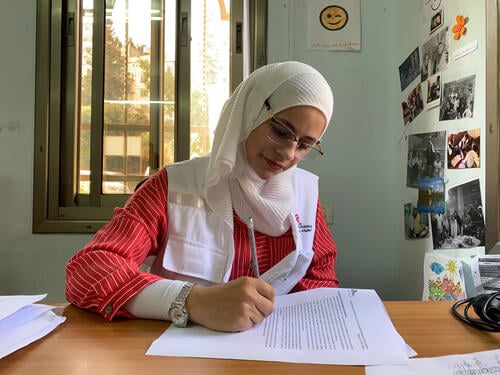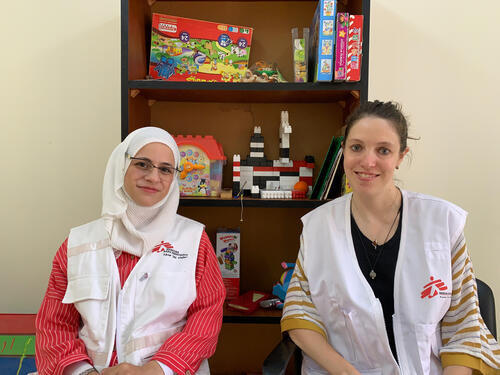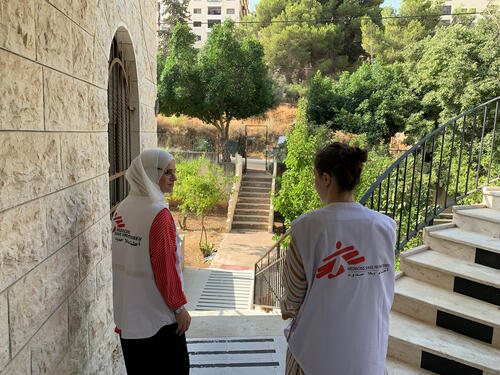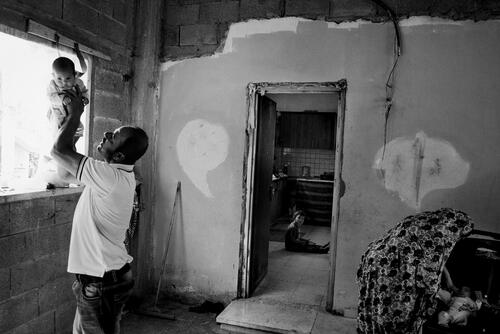People living in the north of the West Bank face a complex array of pressures: more than 50 years of Israel’s military occupation of the area, a poor economy, a conservative society at a time of transition – all of this can add up and increase the burden of mental health issues in the community.
MSF is providing psychotherapy services in Nablus and Qalqiliya. While three of our psychologists in the project are local Palestinians, two are foreigners who do not speak Arabic. This means interpreters play a vital role in our work there.
The talking cure was a breakthrough in psychotherapy: the realisation that speech can be a healer, in some cases even more powerful than medication.
Psychotherapy is a process of talking through mental health issues with a trained professional, analysing possible causes and ways in which to address them. It is this service that MSF offers in the northern West Bank, where we provide therapy and psychiatric support to people with moderate to severe mental health issues.
How does it work, however, when the psychologist and client speak different languages, come from different cultures, and have wildly divergent experiences of the world? The answer is through one of MSF’s expert interpreters.
“We don’t just translate language, we also act as mediators,” says Layali, an interpreter who first worked with MSF’s team in 2007.
We have to translate feelings and not only the words of the patients. It’s about making sure that the patients feel that we understand them.Layali, interpreter
In psychotherapy, the relationship between therapist and person seeking treatment, or participant, is vitally important. It is through an empathetic, ethical bond that the work of analysis functions – and usually it is just the two people in the room, with everything they say absolutely confidential. In MSF’s project in the West Bank, the interpreter takes on the vital role of creating that link between participant and therapist, and also keeps confidential all that is said.
“In order to create a real link with the patient you have to feel what they are feeling,” explains Layali. “You also have to guard the same distance from the person as the psychologists – to be respectful of the same ethics that they respect.”
“With the interpreter present, it changes the dynamic of the session,” says Lea, a psychologist from France. “Obviously we talk a lot about emotions, but here it’s the interpreter that receives the emotions instead of them coming directly to the psychologist.”
Likewise, the communication in the other direction flows through the interpreter, with them having to carefully choose how to render the therapist’s questions into Arabic.
“The biggest challenge of working with a translator is that someone is talking instead of you, so the collaboration between the psychologist and interpreter is essential,” says Lea. “You have to trust them 100 per cent.”
The fact that the Arabic language works in a very different way from French and English increases the challenge for the interpreters. This is not only a technical issue of vocabulary, phrasing and grammar, however: it relates to the culture in which the language is used.

It is therefore also the job of the interpreter to ensure that the psychologist has enough information to understand not only the words of the participant, but also their context.
“We have to do a lot of cultural mediation to try to transmit the meaning of words that might be stock phrases or have no direct equivalents,” says Layali. “The person’s tone and body language are very important for me to choose the right word. Sometimes I have to discuss with the psychologist what the right word to convey the meaning is.”
Lea gave an example. “When people here are asked how they are, they all say ‘al-hamdulilah’, which means ‘praise God’ literally and ‘I’m fine’ figuratively. Even someone with severe depression will answer this when asked how they are, which at first appeared strange to me. I had to learn from the translator that that’s the socially expected answer and that I have to go deeper to learn how someone is really feeling.”
All this is to say that the interpreter is a vital part of the therapeutic team without whom the therapy could not take place. It also means, however, that the interpreter is hearing the same – often upsetting – things as the therapist. Often in Palestine those things are about violence related to Israel’s occupation, but they can also be more universal: dark thoughts of suicide, physical or sexual abuse, loneliness or despair.
“When I was new in the job I was very affected,” says Layali. “I thought a lot at home about people who didn’t have enough or who were suffering violence in their families.”
“As psychologists we learn to manage our emotions and have supervision to help us know what we find particularly difficult to deal with,” says Lea. “Having an interpreter changes my job because not only now am I having to take care of the person, but also of the interpreter.”

It is for this reason that the interpreters are offered the same help and support as the psychologists to help them deal with what they hear and continue their work.
“With the psychologist we do a debriefing after each session to talk about the case and to discuss how it makes us feel and we have external supervision once a month,” explains Layali. “With supervision I’ve been able to deal with what I hear in the job. You have to be able to be empathetic without being over-involved.”
Taking care of our team lets us keep taking care of patients in a place in which it is not easy to access psychotherapy, therefore filling a gap in an area where mental health support is vital.
“For many people the concept of psychotherapy is unfamiliar,” says Layali. “They often ask, ‘Is this just going to be talking? How can we benefit?’. So when they trust us enough to come to a session, it’s all about making sure that they feel that we understand them.”
Layali smiles as she remembers what one patient told her after they finished a consultation together: “Thank you. You’re not just someone that knows how to talk, but also how to feel.”






